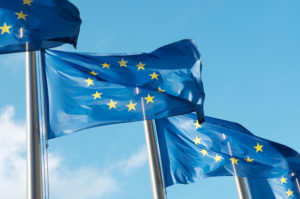Highlights from the Past Week
CW 4 / Monday, 23 to Thursday, 26 January: Committee and Mini-Plenary Sessions Week (Brussels);
E-EVIDENCE – COREPER ENDORSES TRILOGUE AGREEMENT: Following the political agreement reached in December, Member States have confirmed the agreement between the Council presidency and the European Parliament on the draft regulation on cross-border access to electronic evidence (text – PDF; EP press release).
The main elements of the agreement include:
- The creation of European production and preservation orders for e-evidence that can be issued by judicial authorities in order to obtain or preserve e-evidence, regardless of the location and type of data (subscriber, traffic and content data).
- A threshold for traffic data (except for data requested for the sole purpose of identifying the user) and for content data.
- Data can only be requested for crimes punishable in the issuing country by a maximum custodial sentence of at least three years (or for specific offences relating to cybercrime, child pornography, counterfeiting of non-cash means of payment or terrorism).
- A mandatory deadline of 10 days to respond to a production order. In duly established emergency cases, the deadline may be reduced to eight hours.
- Sanctions, including a financial penalty of up to two per cent of annual turnover;
- A reporting system for traffic and content data;
- If there are grounds for refusal, retroactive measures can be taken in emergency situations.
The final confirmation in the Council is still pending. The European Parliament will also have to vote on the compromise text, both in the committee (LIBE, 31 January) and in the plenary.
DATA ACT I – NEW COMPROMISE PROPOSAL IN THE COUNCIL: The Swedish EU Presidency circulated a new compromise on the Data Act (PDF) last week.
The proposal makes a number of changes, including on trade secrets, the relationship between the Data Act and the General Data Protection Regulation (GDPR), and data sharing between small and medium-sized enterprises and the state (“business to government”). In the new version, trade secrets are to be better protected by excluding data sharing in competing products. In addition, the option was established to introduce further confidentiality measures for data sharing so that trade secrets can be protected.
Obligations to share data with the state have been limited to emergencies for small companies, and Sweden proposes a compensation option for such cases. New proposals are also emerging on the question of which measures apply to which data. There have been heated discussions so far about what actually counts as a connected product whose data must be shared by the manufacturer. In the new draft, the Swedes move away from a concrete definition of the product and instead focus on the function of the data.
The compromise will be discussed in the Telecom Working Party on Tuesday, with feedback on the remaining points expected on 3 February. The trilogue negotiations should be able to start as early as March (see Euractiv and Tagesspiegel Background, paywall – DE).
DATA ACT II – LIBE AIMS TO STRENGTHEN DATA PROTECTION: In the coming week, the Committee on Civil Liberties (LIBE) will vote on the opinion on the Data Act. The compromise amendments (PDF) specify that the proposal does not create a new legal basis for the processing of personal data, an area in which the Committee has exclusive competence. Furthermore, in the event of a conflict, data protection rules are to prevail.
As for the rest of the proposal, rapporteur S. Lagodinsky (Greens, DE) was ultimately unable to obtain the deletion of Chapter V on data exchange with the public sector (B2G). However, there is an intention to delete the grounds that can lead to a mandatory transfer of company data to the state, namely those related to the performance of a task in the public interest (15c).
The vote of the lead industry committee (ITRE) is scheduled for 9 February. (see Contexte, paywall, FR).
Last week, successful votes were held for the opinions of the Legal Affairs and Internal Market Committees.
ARTIFICIAL INTELLIGENCE I – NEW COMPROMISE PROPOSALS ON HIGH-RISK SYSTEMS: B. Benifei (S&D) and D. Tudorache (Renew) maintain the idea of setting additional conditions to view a system used in the situations listed in Annex III of the proposal as a “high-risk system”. In their opinion, such a system is one which poses a risk to health, safety and fundamental rights. Instead of allowing the provider to carry out a self-assessment, as proposed by the EPP, Renew and the Greens, the co-rapporteurs authorised a “reasoned application” to the National Supervisory Authority for an exemption from fulfilling the requirements related to high-risk systems. The co-rapporteurs also provide clarification on the “regulatory sandbox” concept. (Batch 4, Batch 5, Batch 10 – PDF; see Contexte, paywall, FR)
ARTIFICIAL INTELLIGENCE II – COUNCIL PUTS NEGOTIATIONS ON HOLD: In mid-January, the Council’s Working Party on Civil Law Matters concluded its first fast-track reading of the draft directives to modernise the Directive concerning liability for defective products and the AI Liability Directive. A majority of Member States underlined the close link between the latter proposal and the AI legislation currently under negotiation. Accordingly, the Swedish Presidency decided to put this proposal on hold pending progress on the AI legislation and to focus on the proposal on defective products. (see Contexte, paywall, FR)
CSAM – FIRST TIMELINE IN THE EP: The Internal Market Committee (IMCO) has published a first outline on the timetable for its own report on the CSAM Regulation (PDF). According to this outline, the draft opinion is to be discussed in the committee at the beginning of March. The deadline for amendments would be one week later. The vote in the IMCO Committee should take place at the end of June.
The work in the Culture Committee is already further advanced. They want to vote on their own opinion at the end of March.
In the lead LIBE Committee, the draft report is set for presentation on 14 April, with the vote scheduled for 21 September. Four workshops have in the meantime been scheduled. The first ones took place with the participation of academics and Europol. The third, with industry representatives, is scheduled for 7 February.
A first summary of the external study commissioned by the Parliament should be available by mid-February – one month before the final study. (see Euractiv)
DIGITAL MARKETS ACT – FURTHER COMMISSION WORKSHOPS: The EU Commission has published plans for its next two workshops to gather stakeholders’ views on the implementation of the Digital Markets Act (DMA). On 27 February, a workshop will be organised on the interoperability between messenger services, covering topics such as end-to-end encryption, security and user identification. On 6 March, the focus will be on app stores, looking in particular at alternative in-app payment systems, steering and sideloading.
EID – AGREEMENT REACHED IN INDUSTRY COMMITTEE: According to media information (see Euractiv), MEPs in the Industry Committee (ITRE) reached a political agreement on the European Digital Identity (eID) in the shadow rapporteur meeting last week. In technical meetings, the text should still be refined (status as of 13 January, PDF).
The question of the unique identifier was solved by limiting it to cross-border authentication for accessing public and financial services. The other open question was on the Qualified website authentication certificate (QWAC), which prompts web browsers like Mozilla to mobilise against potential government control over Internet access. The compromise found is somewhat aligned with the Council’s general approach, as it mandates a less prescriptive approach that lets the browsers disregard the obligation if they think that it endangers security, privacy and loss of integrity. In these cases, however, they would have to inform the Commission.
POLITICAL ONLINE ADVERTISING – EP COMMITTEE CONFIRMS REPORT: The Internal Market Committee (IMCO) last week adopted its draft report on the regulation of political advertising. Significant changes to the Commission’s original proposal were made in areas including transparency, ad repositories, sensitive data and law enforcement. (see EP press release)
The vote in the plenary (Thursday) could involve significant tension, as there is a lot of contention, especially on the part of Renew and the EPP (see Euractiv).
MEDIA FREEDOM – FOUR MEMBER STATES STAND FOR ENHANCED MEDIA PROTECTION: As EU countries negotiate their amendments to the European Media Freedom Act (EMFA), Austria and Germany have said they want to give even more power to the media, while France and Poland have broadly supported the Commission’s concept, which has sparked controversy due to fears about disinformation.
Digital rights NGOs, on the other hand, have called on the European Parliament and EU countries to reject the provisions. Meanwhile, news publishers and broadcasters consider the measures to be too weak.
In a document dated 15 November 2022, Austria questioned whether media publishers would be sufficiently protected from the moderation of very large online platforms and suggested that an effective remedy be introduced for news publishers. German officials also wrote that requiring providers of very large online platforms to communicate their already adopted moderation decisions to the media service providers concerned is not sufficient.
France proposed giving media a special status to challenge the moderation of content by major search engines such as Google. While Poland expressed support for the Commission’s concept, it also pointed out that resolving disputes between big tech and media providers over content moderation issues could become “extremely” complicated with the multiplication of rules from the Audiovisual Media Services Directive to the Digital Services Act.
The rotating Swedish EU Presidency circulated ideas for a compromise on a European Regulatory Council on 20 January. Negotiations in EU capitals are still ongoing, while the European Parliament has yet to decide on the work of its various committees. (see Politico Pro, paywall)
PRIVACY SHIELD – EDPS CAUTIOUSLY OPTIMISTIC: European Data Protection Supervisor W. Wiewiórowski says the new draft transatlantic data flows pact is an improvement on previous deals that have been shot down for violating EU privacy standards.
In an interview with Politico (paywall) last week, the EDPS said the new draft pact issued by the European Commission in December is “something new and very promising”.
Despite his optimism about the new agreement, Wiewiórowski did concede that not everyone shares his view.
DOMAINS – COMMISSION TO HAVE A WRITTEN STUDY ON WHOIS DATA: The European Commission intends to launch a study on domain name registration data. Interested parties can express their interest in participating in the tender via the eTendering portal up until 12 February.
The aim of the study is to highlight current and good practices for the collection, maintenance and accessibility of domain name registration (WHOIS) data. It should cover the most important steps in the life cycle of WHOIS data, from collection to disclosure. (see COM call for tender)
Relevant Publications, including from the EP Think Tank:
A Selection of the EU Commission’s Consultations
- Combating online piracy of live content – 13 January to 10 February 2023
- VAT in the digital age – 8 December 2022 – 17 March 2023
- Digital fairness – fitness check on EU consumer law – 28 November 2022 to 20 February 2023
Outlook for the Current Week
You can find a list of the upcoming dates of the European Parliament here, as well as an overview of the plenary session week.
The meeting calendar for 2023 is available here (PDF).
An overview of the most important dates of the Council week can be found here and the meeting calendar can be accessed here.
The official calendar as well as the programme of the Swedish Presidency can be found on the associated website.
Included among the Council dates are:
Summits and Ministerial Meetings:
- Agriculture and Fisheries Council, Monday, 30 January – Agenda, A Items: Part 1, Part 2, Part 3, Part 4; Background Brief;
Preparatory Bodies:
- Working Group Judicial Cooperation in Criminal Matters (COPEN), Monday, 30 January, and Tuesday, 31 January;
- Working Party on Telecommunications and Information Society (incl. Data Act), Tuesday, 31 January;
- Working Party on Competitiveness and Growth (Industry), Tuesday, 31 January;
- Working Party on Tax Questions (Indirect Taxation) (incl. VAT in the Digital Age Packet), Tuesday, 31 January and Thursday, 2 February;
- Working Party on Competitiveness and Growth (Internal Market) Monday, 30 January, Tuesday, 31 January and Friday, 3 February;
- Working Party on Consumer Protection and Information, Friday, 3 February;
- Horizontal Working Party on Cyber Issues, Wednesday, 1 February and Friday, 3 February;
- COREPER I (incl. RED), Wednesday, 1 February;
- COREPER II, Tuesday, 31 January, Wednesday, 1 and Thursday, 2 February, as well as Sunday, 5 February;
Information on the weekly Commission meeting can be found on the Commission’s website in the preview (PDF) or (at short notice) in the current agenda.
The following topic is on the agenda for the coming week:
- Contribution to February EUCO
You can find the judicial calendar of the ECJ here.
European Parliament Committees
CW 5 / Monday, 30 January to Thursday, 2 February: Mini-Plenary Sessions Week (Brussels);
LIBE Committee (Civil Liberties)
Current Meetings
- Monday, 30January 2023, 15.00-18.30 (Brussels)
- Tuesday, 31 January 2023, 9.00-12.30 and 14.00-18.00 (Brussels)
Excerpt from the Draft Agenda
…
Tuesday, 12.00 – 12.30
European Production and Preservation Orders for electronic evidence in criminal matters, harmonised rules on the appointment of legal representatives for the purpose of gathering evidence in criminal proceedings (the e-Evidence package): vote on agreement from interinstitutional negotiations. Rapporteur: Birgit Sippel (S&D, Germany).
…
30 January 2023, 15.00 – 16.45
- Swedish Presidency of the Council of the European Union, 2023
LIBE/9/11119
Exchange of views with:
– Jessika Roswall, Minister for EU Affairs
– Gunnar Strömmer, Minister for Justice
– Maria Malmer Stenergard, Minister for Migration
…
31 January 2023, 10.00 – 10.20
- Laying down measures for a high common level of cybersecurity at the institutions, bodies, offices and agencies of the Union
LIBE/9/08709
***I 2022/0085(COD) COM(2022)0122 – C9-0122/2022
| Rapporteur for the opinion: | |||
| Tomas Tobé (PPE) | PA – PE739.801v01-00 | ||
| Responsible: | |||
| ITRE* | Henna Virkkunen (PPE) | PR – PE737.231v01-00 AM – PE738.403v01-00 |
|
- Consideration of draft opinion
…
31 January 2023, 12.00 – 12.30
*** Electronic vote ***
…
- Harmonised rules on fair access to and use of data (Data Act)
LIBE/9/08518
***I 2022/0047(COD) COM(2022)0068 – C9-0051/2022
| Rapporteur for the opinion: | |||
| Sergey Lagodinsky (Verts/ALE) | PA – PE737.389v01-00 AM – PE738.725v01-00 AM – PE738.644v01-00 |
||
| Responsible: | |||
| ITRE* | Pilar del Castillo Vera (PPE) | PR – PE732.704v01-00 AM – PE738.549v01-00 AM – PE738.511v01-00 AM – PE738.548v01-00 AM – PE738.509v01-00 |
|
- Adoption of draft opinion
*** End of electronic vote ***
31 January 2023, 14.00 – 15.00
- Draft adequacy decision on the EU-US Data Privacy Framework
LIBE/9/11126
- Exchange of views with Didier Reynders, Commissioner for Justice
…
31 January 2023, 16.00 – 18.00
In association with Committee on the Internal Market and Consumer Protection and Committee on Culture and Education
Public hearing
- European Media Freedom Act
LIBE/9/11128
(separate agenda)
…
Further Meetings (Calendar)
- Monday, 6 February 2023, 15.00-18.30 (Brussels)
JURI Committee (Legal Affairs)
Current Meetings
- Tuesday, 31 January 2023, 9.00-11.00 (Brussels)
Excerpt from the Draft Agenda
The current agenda does not contain any topics of direct relevance to the Internet industry.
Further Meetings (Calendar)
- 27/28 February 2023
Dossiers Timetable (13 December 2022)
ITRE Committee (Industry)
Current Meetings
- None
Further Meetings (Calendar)
- Monday, 6 February (Brussels)
- Thursday, 9 February (Brussels)
Dossiers Timetable (17 January 2023)
IMCO Committee (Internal Market)
Current Meetings
- None
Further Meetings (Calendar)
- Monday, 6 February (Brussels)
- Wednesday, 1 / Thursday, 2 March (Brussels)
Dossiers Timetable (January 2023)
CULT Committee (Culture)
Current Meetings
- None
Further Meetings (Calendar)
- Monday, 6 February (Brussels)
- Wednesday, 1 / Thursday, 2 March (Brussels)
PEGA Committee (Pegasus Committee of Inquiry)
Current Meetings
- None
Further Meetings
- Thursday, 9 February 2023, 15.00-18.30 (Brussels)
INGE2 Committee (Special Committee on Foreign Interference)
Current Meetings
- None
Further Meetings (Calendar)
- Tuesday, 28 February, 14.00-18.00 (Brussels)
Further Parliamentary Calendar Dates
- CW 6 / Monday, 6 to Thursday, 9 February: Political Group and Committee Meetings Week (Brussels);
- CW 7 / Monday, 13 to Thursday, 16 February: Plenary Sessions Week (Strasbourg);
- CW 8 / Monday, 20 to Friday, 24 February: Green Week (no meetings);




